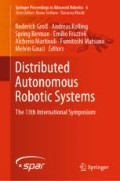Abstract
A robotic swarm is a particular type of multi-robot system that employs a large number of simple agents in order to cooperatively perform different types of tasks. In this context, a topic that has received much attention in recent years is the concept of segregation. This concept is important, for example, in tasks that require maintaining robots with similar features or objectives arranged in cohesive groups, while robots with different characteristics remain separated on their own groups. In this paper we propose a decentralized methodology to navigate heterogeneous groups of robots whilst maintaining segregation among different groups. Our approach consists of extending the ORCA algorithm with a modified version of the classical flocking behaviors to keep robots segregated. A series of simulations and real experiments show that the groups were able to navigate in a cohesive fashion in all evaluated scenarios. Furthermore, the methodology allowed for a faster convergence of the group to the goal when compared to state-of-the-art algorithms.
This work was developed with the support of CNPq, CAPES, FAPEMIG, and ITV - Instituto Tecnologico Vale.
Access this chapter
Tax calculation will be finalised at checkout
Purchases are for personal use only
References
De Luca, A., Oriolo, G., Vendittelli, M.: Stabilization of the unicycle via dynamic feedback linearization. In: 6th IFAC Symp. on Robot Control, pp. 397–402 (2000)
Egerstedt, M., Hu, X.: Formation constrained multi-agent control. In: ICRA’01. IEEE International Conference on Robotics and Automation, 2001, vol. 4, pp. 3961–3966 (2001)
Ferreira Filho, E.B., Pimenta, L.C.A.: Segregating multiple groups of heterogeneous units in robot swarms using abstractions. In: Proceedings of the IEEE International Conference on Intelligent Robots and Systems (IROS), pp. 401–406 (2015)
Fiorini, P., Shiller, Z.: Motion planning in dynamic environments using velocity obstacles. Int. J. Robot. Res. 17(7), 760–772 (1998)
Groß, R., Magnenat, S., Mondada, F.: Segregation in swarms of mobile robots based on the brazil nut effect. In: Proceedings of the IEEE International Conference on Intelligent Robots and Systems (IROS), pp. 4349–4356 (2009)
He, L., van den Berg, J.: Meso-scale planning for multi-agent navigation. In: Proceedings of the IEEE International Conference on Robotics and Automation (ICRA) (2013)
Kumar, M., Garg, D.P., Kumar, V.: Segregation of heterogeneous units in a swarm of robotic agents. IEEE Trans. Autom. Control 55(3), 743–748 (2010)
Reynolds, C.W.: Flocks, herds and schools: a distributed behavioral model. In: ACM Siggraph Computer Graphics, vol. 21, pp. 25–34. ACM (1987)
Şahin, E.: Swarm robotics: from sources of inspiration to domains of application. In: Swarm robotics, pp. 10–20. Springer (2005)
Santos, V.G., Campos, M.F., Chaimowicz, L.: On segregative behaviors using flocking and velocity obstacles. In: Distributed Autonomous Robotic Systems, pp. 121–133. Springer (2014)
Santos, V.G., Pimenta, L.C., Chaimowicz, L., et al.: Segregation of multiple heterogeneous units in a robotic swarm. In: 2014 IEEE International Conference on Robotics and Automation (ICRA), pp. 1112–1117. IEEE (2014)
Snape, J., Guy, S.J., Vembar, D., Lake, A., Lin, M.C., Manocha11, D.: Reciprocal collision avoidance and navigation for video games. In: Game Developers Conference, San Francisco (2012)
Van Den Berg, J., Guy, S.J., Lin, M., Manocha, D.: Optimal reciprocal collision avoidance for multi-agent navigation. In: Proceedings of the IEEE International Conference on Robotics and Automation, Anchorage (AK), USA (2010)
Van Den Berg, J., Guy, S.J., Lin, M., Manocha, D.: Reciprocal n-body collision avoidance. In: Robotics research, pp. 3–19. Springer (2011)
Wilkie, D., Van den Berg, J., Manocha, D.: Generalized velocity obstacles. In: IEEE/RSJ International Conference on Intelligent Robots and Systems, 2009. IROS 2009, pp. 5573–5578. IEEE (2009)
Author information
Authors and Affiliations
Corresponding author
Editor information
Editors and Affiliations
Rights and permissions
Copyright information
© 2018 Springer International Publishing AG
About this chapter
Cite this chapter
Inácio, F.R., Macharet, D.G., Chaimowicz, L. (2018). United We Move: Decentralized Segregated Robotic Swarm Navigation. In: Groß, R., et al. Distributed Autonomous Robotic Systems. Springer Proceedings in Advanced Robotics, vol 6. Springer, Cham. https://doi.org/10.1007/978-3-319-73008-0_22
Download citation
DOI: https://doi.org/10.1007/978-3-319-73008-0_22
Published:
Publisher Name: Springer, Cham
Print ISBN: 978-3-319-73006-6
Online ISBN: 978-3-319-73008-0
eBook Packages: EngineeringEngineering (R0)

